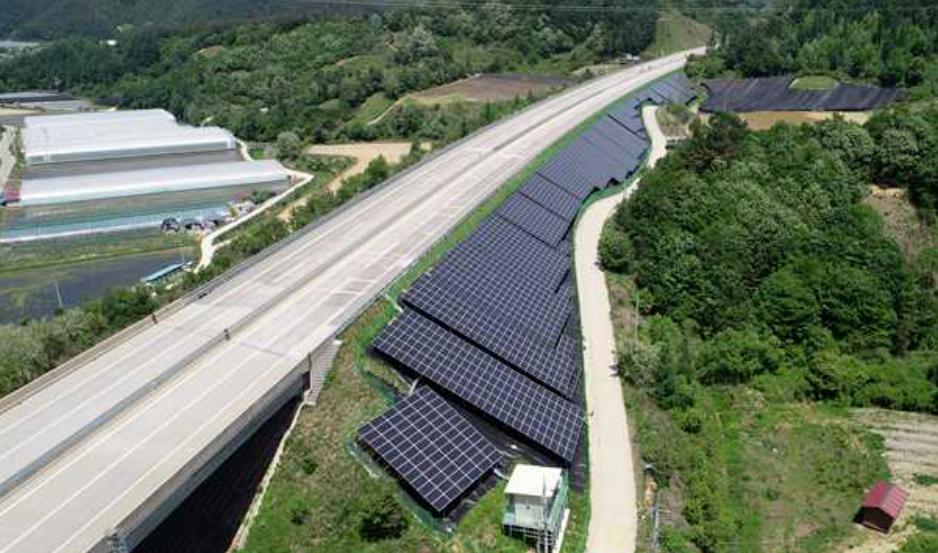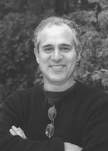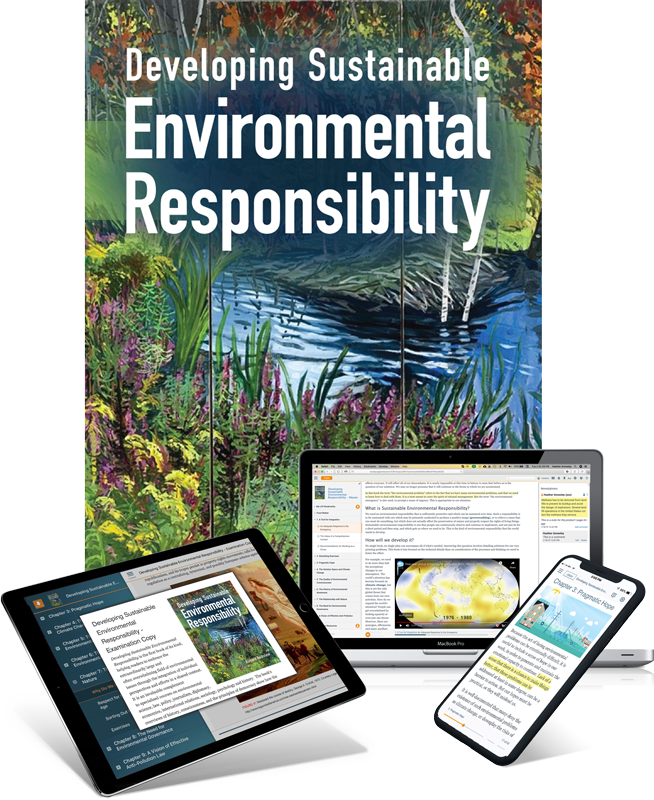Context and Purpose, Activities
“South Korea wants to build large-scale PV along highways”, PV magazine, April 9, 2021, Emiliano Bellini. Image: Ministry of Land, Infrastructure and Transport. Featured by student Gritzko Erickson in a presentation to a town sustainability committee on the importance of finding places to put solar that do not involve cutting down trees.
Among all the distressing news of our impact on the planet is evidence of rising awareness, which brings the hope of behavior change. As a lifelong environmentalist I am used to hearing that “people don’t change”, and while my own profession showed me repeatedly that they can - for the better, too – the dominant trends have too often seemed to reflect arrested development of the body politic. And while so many steps have been taken towards the world we deserve and the rest of life deserves from us, it has so often seemed pathetically not nearly enough. Nevertheless, at the same time that one grapples with that feeling, one can and should also recognize good news.
To mention just a few highlights: Scott Cassel’s decades-long work with the Product Stewardship Institute, after quiet victories in state after state, got national attention with Maine’s plastic recycling mandate;[i] Norway, the leading European producer of fossil fuels, just had what is being called a “climate election”;[ii] Representative Barbara Lee, the sole opponent of the Authorization for Use of Military Force[iii] which gave G.W. Bush the power to wage war in Afghanistan and then Iraq, is now joined by “almost every Democrat” and 49 Republicans in her decades-long effort to repeal this open permission to wage war,[iv] and the aid provided during the pandemic has substantially reduced the poverty rate. For those who realize that protecting the planet requires not just smart regulation but also reorienting government towards peace and prosperity, these are good signs.
For me, the fact that my classes are full is a manifestly real sign, because they haven’t always been. There are 15 students ready to do projects in “Research for Environmental Agencies and Organizations”. There are 30 students in “Law for Sustainability”, which is not taught in the law school, but to students in science, analysis, policy, engineering, management, international relations, even theatre: young citizens who know they need to understand and engage with their own democracy to make things work as they should. And there are 13 students in “Reconstructing Environmental Governance” – this one had a couple dropping out – it is more challenging - the students are being asked not just to grasp how the government works but how it needs to be reshaped. I am very excited after having conducted just a few opening classes, for I am meeting a whole new generation that knows the necessity of being responsible, and they are excited. I don’t know how many people my age (many of my contemporaries are retired) have this kind of contact. That is why I share this comment. After so many years teaching environmental issues, during which I had to work hard to develop ways of communicating hope, during which attention to the issues dipped, the students are giving me a fresh charge.
A student in this summer’s project class, (www.bu.edu/rccp), Shanay Sanghvi, taking the course from India, had the idea of helping a poor village install solar power and is making it happen. Another student, Alicia Zhang, analyzed the engagement of Boston’s Community Choice program with the environmental justice (EJ) community and together we presented recommendations to the National EJ Advisory Council on helping EJ communities across the nation reduce their electricity costs. The Institute for Sustainable Energy posted Alicia’s blog pointing out that such programs can increase energy justice and boost local economies with decentralized clean power generation, and that implementation can be speeded through coalition building.[i]
Trevor Powell helped the organization Quiet Communities by interviewing key figures who have brought about restrictions on the use of highly polluting and noisy gas-powered leaf blowers.
Griztko Erickson presented to the Sustainable Lexington committee on how solar panels can be sited without having to cut down trees, a growing problem. He showed how innovative solar projects around the world use otherwise “fallow” space, such as highway exit ramps, under power lines, and over roadways. Dena Ciampa examined options for employing passive cooling techniques in public housing for a greatly appreciative Department of Housing and Community Development; Tyler Anderson showed how a public business information database could help the Massachusetts Department of Environmental Protection target violators, and Peri Taubman did background preparation for hearings on lead poisoning. Each student inspired with their hard work and dedication, and I learned once again the value of thinking about the things you believe ought to happen and communicating that. I tell the students that anyone can become usefully knowledgeable about a problem and potential solutions within a short time and that they can become successful if they keep working on it and work with others. (Also if we combine persistence with patience). I tell them to go talk to the librarian, to ask me and each other questions, to read widely, and to consult experts (we prepare for those contacts). They bring their spirit and you can see it in the high level of professionalism that their work generally shows.
This semester’s students have just picked their projects: we will be putting on a virtual conference on eliminating lead poisoning, analyzing data about what communities are doing concerning gas-powered leaf-blowers, trying to figure out where and how certain toxic chemicals are being used, and following up on the "solar without cutting down trees" idea - our new term "Environmentally Preferable Solar Placement" refers to finding sidewalks to cover (for shade), talking to utilities and road authorities, investigating vertical solar for south-facing walls, solar on brownfields. Students will analyze data on energy efficiency in housing for the state Department of Energy Resources and how to enforce the requirement of "habitability" in Section 8 housing, for the Mass Fair Housing Association. They will work on community resiliency in the Caribbean for the EPA and figure out the next steps for the draft guidance previous students wrote about "Helping Indigenous Peoples Stay on their Land" (at www.bu.edu/rccp). There is a concept of somehow getting some pieces of the billions made from the name “Amazon” to the actual peoples of the Amazon, for protecting the Amazon. Call it a gesture of respect from the first world. We have a team working with a group called Power-d.city to develop tools for assessing municipal progress on climate action. It is not easy to get the data needed. Figuring out good ways to get it from the utilities could really help communities who want to track energy progress.
This is what students in the project class will do. In my other classes, students will also work on ways to improve environmental and public health, thinking about how citizens can use the law. For many long years as an environmental professional and teacher, after the receding of the high-water era when great laws were passed, I too often felt that I was wrestling with such problems with a small and ragged and underfunded band of gentle warriors, who too often could not find the weapons or tools effective enough to turn the tide. But there is a movement building of clear-eyed young citizens – it reminds me of my teenage years in the sixties, when everyone with an open attitude was part of a friendly group that was turning from war, pollution, exploitation, and mechanistic, soul-killing culture. This is not a report on trends across the country. It may only be anecdotal, but that does not make it insignificant.
[i] https://resource-recycling.com/plastics/2021/07/14/nations-first-packaging-epr-bill-is-signed-into-law/
[ii] “With Climate Driving Issue, Norway Puts Center-Left in Charge”, Elian Peltier, The New York Times, September 15, 2021, p. A6.
[iii] https://www.congress.gov/107/plaws/publ40/PLAW-107publ40.pdf
[iv] “Quest to Curb War Powers of President Faces New Test”, Catie Edmondson, The New York Times, September 15, 2021, p. A17.
[v] https://www.bu.edu/ise/2021/09/07/achieving-equity-with-community-choice-aggregation-four-recommendations/
A student in this summer’s project class, (www.bu.edu/rccp), Shanay Sanghvi, taking the course from India, had the idea of helping a poor village install solar power and is making it happen. Another student, Alicia Zhang, analyzed the engagement of Boston’s Community Choice program with the environmental justice (EJ) community and together we presented recommendations to the National EJ Advisory Council on helping EJ communities across the nation reduce their electricity costs. The Institute for Sustainable Energy posted Alicia’s blog pointing out that such programs can increase energy justice and boost local economies with decentralized clean power generation, and that implementation can be speeded through coalition building.[i]
Trevor Powell helped the organization Quiet Communities by interviewing key figures who have brought about restrictions on the use of highly polluting and noisy gas-powered leaf blowers.
Griztko Erickson presented to the Sustainable Lexington committee on how solar panels can be sited without having to cut down trees, a growing problem. He showed how innovative solar projects around the world use otherwise “fallow” space, such as highway exit ramps, under power lines, and over roadways. Dena Ciampa examined options for employing passive cooling techniques in public housing for a greatly appreciative Department of Housing and Community Development; Tyler Anderson showed how a public business information database could help the Massachusetts Department of Environmental Protection target violators, and Peri Taubman did background preparation for hearings on lead poisoning. Each student inspired with their hard work and dedication, and I learned once again the value of thinking about the things you believe ought to happen and communicating that. I tell the students that anyone can become usefully knowledgeable about a problem and potential solutions within a short time and that they can become successful if they keep working on it and work with others. (Also if we combine persistence with patience). I tell them to go talk to the librarian, to ask me and each other questions, to read widely, and to consult experts (we prepare for those contacts). They bring their spirit and you can see it in the high level of professionalism that their work generally shows.
This semester’s students have just picked their projects: we will be putting on a virtual conference on eliminating lead poisoning, analyzing data about what communities are doing concerning gas-powered leaf-blowers, trying to figure out where and how certain toxic chemicals are being used, and following up on the "solar without cutting down trees" idea - our new term "Environmentally Preferable Solar Placement" refers to finding sidewalks to cover (for shade), talking to utilities and road authorities, investigating vertical solar for south-facing walls, solar on brownfields. Students will analyze data on energy efficiency in housing for the state Department of Energy Resources and how to enforce the requirement of "habitability" in Section 8 housing, for the Mass Fair Housing Association. They will work on community resiliency in the Caribbean for the EPA and figure out the next steps for the draft guidance previous students wrote about "Helping Indigenous Peoples Stay on their Land" (at www.bu.edu/rccp). There is a concept of somehow getting some pieces of the billions made from the name “Amazon” to the actual peoples of the Amazon, for protecting the Amazon. Call it a gesture of respect from the first world. We have a team working with a group called Power-d.city to develop tools for assessing municipal progress on climate action. It is not easy to get the data needed. Figuring out good ways to get it from the utilities could really help communities who want to track energy progress.
This is what students in the project class will do. In my other classes, students will also work on ways to improve environmental and public health, thinking about how citizens can use the law. For many long years as an environmental professional and teacher, after the receding of the high-water era when great laws were passed, I too often felt that I was wrestling with such problems with a small and ragged and underfunded band of gentle warriors, who too often could not find the weapons or tools effective enough to turn the tide. But there is a movement building of clear-eyed young citizens – it reminds me of my teenage years in the sixties, when everyone with an open attitude was part of a friendly group that was turning from war, pollution, exploitation, and mechanistic, soul-killing culture. This is not a report on trends across the country. It may only be anecdotal, but that does not make it insignificant.
[i] https://resource-recycling.com/plastics/2021/07/14/nations-first-packaging-epr-bill-is-signed-into-law/
[ii] “With Climate Driving Issue, Norway Puts Center-Left in Charge”, Elian Peltier, The New York Times, September 15, 2021, p. A6.
[iii] https://www.congress.gov/107/plaws/publ40/PLAW-107publ40.pdf
[iv] “Quest to Curb War Powers of President Faces New Test”, Catie Edmondson, The New York Times, September 15, 2021, p. A17.
[v] https://www.bu.edu/ise/2021/09/07/achieving-equity-with-community-choice-aggregation-four-recommendations/
As this is a blog supplementing a book sold for use in classes, the publishers have asked me to provide exercises, as in the book (Developing Sustainable Environmental Responsibility). As the blog is shared with a wide audience, not just students in my classes, it is a little embarrassing to give instructions in exercises. Please regard them as amusing and possibly interesting suggestions.
Exercise
Look for signs of rising environmental awareness. Think of ways to contribute to the sense of an acceptable duty to protect, that we can do the necessary things together, that we can talk to each other and find ways to survive, to be happy, without having to destroy anything. Listen to resistance and consider approaches to help bring about changes in attitude. What are the useful principles of that art? How can we engage for amelioration of the delusional political movements that inhibit mature response to reality?
Exercise
Look for signs of rising environmental awareness. Think of ways to contribute to the sense of an acceptable duty to protect, that we can do the necessary things together, that we can talk to each other and find ways to survive, to be happy, without having to destroy anything. Listen to resistance and consider approaches to help bring about changes in attitude. What are the useful principles of that art? How can we engage for amelioration of the delusional political movements that inhibit mature response to reality?

 RSS Feed
RSS Feed

